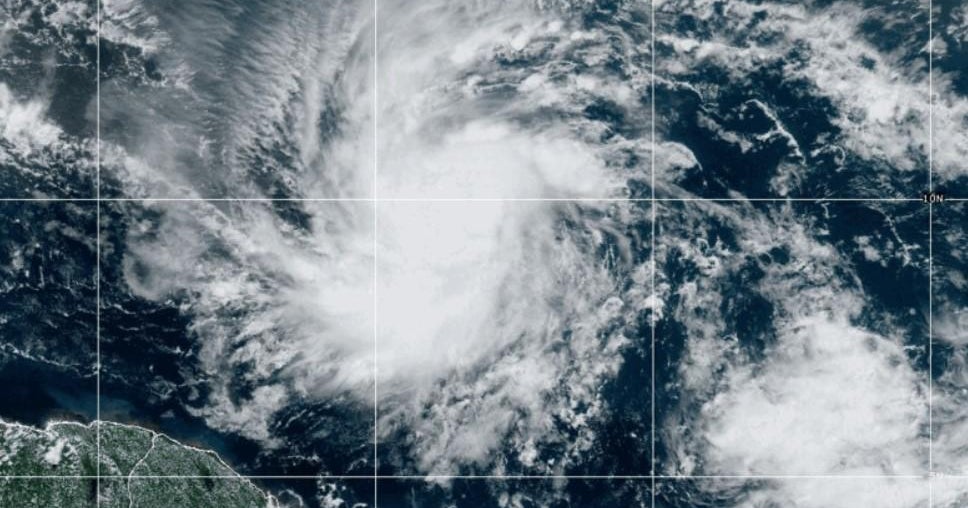World
Hurricane Beryl becomes powerful Category 3 storm as it nears Caribbean islands

Hurricane Beryl became the first Category 3 storm as it churned toward the southeast Caribbean, forecasters warned Sunday morning.
As of 11 a.m. ET, Beryl was located about 355 miles east-southeast of Barbados. It was upgraded to a Category 3 storm with maximum sustained winds of 120 mph and was moving west at 21 mph.
Hurricane warnings are already in effect in Barbados, St. Lucia, Grenada, St. Vincent and the Grenadines and Tobago. Tropical storm warnings are in effect for Martinique, while a tropical storm watch is in effect in Dominica.
“This is a very serious situation developing for the Windward Islands,” warned the Miami-based National Hurricane Center. The center said that Beryl was “forecast to bring life-threatening winds and storm surge … as an extremely dangerous hurricane.”
Beryl is on track to move across the Windward Islands early on Monday as an “extremely dangerous” Category 4 hurricane before traveling through the southeastern Caribbean on Monday night and Tuesday.
Two hurricane hunters were en route to the storm to gather more details about its intensity, according to the National Hurricane Center.
NOAA
Beryl is expected to pass just south of Barbados early Monday and then head into the Caribbean Sea as a major hurricane on a path toward Jamaica and eventually Mexico.
More than fifty years have passed since a hurricane appeared before July 4 in the Atlantic basin. Alma hit the Florida Keys on June 8, 1966, according to Weather Underground.
“It’s astonishing to see a forecast for a major hurricane in June anywhere in the Atlantic, let alone this far east in the deep tropics. #Beryl organizing in a hurry over the warmest waters ever recorded for late June,” Florida-based hurricane expert Michael Lowry posted on social media.
Beryl is the second named storm in what is predicted to be a busy hurricane season, which runs from June 1 to Nov. 30 in the Atlantic. Last week, Tropical Storm Alberto brought torrential flooding to portions of southern Texas and northeastern Mexico. It was responsible for at least four deaths in the Mexican states of Nuevo Leon and Veracruz.
According to CBS News weather producer David Parkinson, Beryl is the farthest east a hurricane has formed in June, and one of only two to do so east of the Caribbean, with the other instance occurring in 1933. Parkinson expects Beryl to remain south of Jamaica, and forecasts that any U.S. impacts are still at least eight days away.
Warm waters are fueling Beryl, with ocean heat content in the deep Atlantic the highest on record for this time of year, according to Brian McNoldy, University of Miami tropical meteorology researcher.
Forecasters warned of a life-threatening storm surge of up to 9 feet in areas where Beryl will make landfall, with up to 6 inches of rain for Barbados and nearby islands.
CHANDAN KHANNA/AFP via Getty Images
Long lines formed at gas stations and grocery stores in Barbados and other islands as people rushed to prepare for a storm that rapidly intensified from a tropical storm with 35 mph winds on Friday to a Category 1 hurricane on Saturday.
“We need to be ready,” Barbadian Prime Minister Mia Mottley said in a public address late Friday. “You and I know when these things happen, it is better to plan for the worst and pray for the best.”
She noted that thousands of people were in Barbados Saturday for the Twenty20 World Cup cricket final, with India beating South Africa on Saturday in the capital of Bridgetown. It is considered cricket’s biggest event.
Meanwhile, St. Vincent and the Grenadines Prime Minister Ralph Gonsalves said in a public address Saturday that shelters will open Sunday evening as he urged people to prepare. He ordered officials to refuel government vehicles and asked grocery stores and gas stations to stay open later before the storm.
“There will be such a rush …if you keep limited hours,” he said as he apologized ahead of time for government interruptions on radio stations with storm updates. “Cricket lovers have to bear with us that we’ll have to give information … this is life and death.”
According to the National Hurricane Center, the season’s first hurricane usually forms in early to mid-August, which makes Beryl unusual for having reached hurricane strength. In a report released last month, the National Oceanic and Atmospheric Administration predicted an “above average” hurricane season with 17 to 25 storms, 8 to 13 hurricanes and 4 to 7 major hurricanes of category 3 or higher. An average Atlantic hurricane season produces 14 named storms, seven of them hurricanes and three major hurricanes.
A tropical storm is a tropical cyclone with maximum sustained winds of 39 to 73 mph, while a hurricane is defined as a tropical cyclone with maximum sustained winds greater than 74 mph.







:max_bytes(150000):strip_icc()/roundup-writereditor-loved-deals-tout-f5de51f85de145b2b1eb99cdb7b6cb84.jpg)


